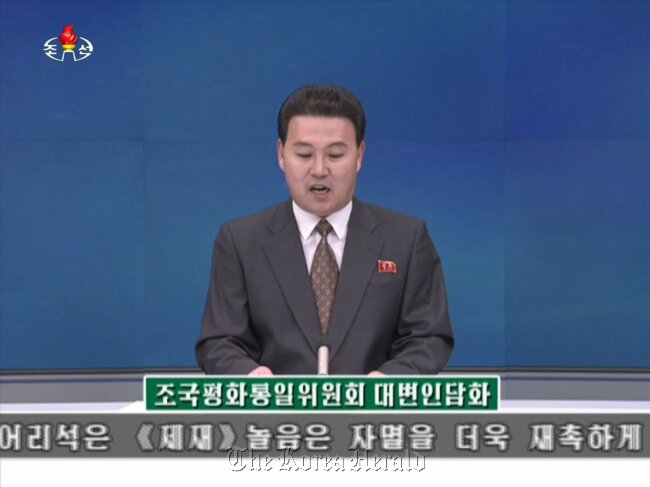Relations between the two Koreas appear to be hanging by a thread as Pyongyang declared plans to abolish all bilateral exchange projects, confiscate all South Korean assets left in the North and stage military actions.
The announcement was made Thursday by the Committee for the Peaceful Reunification of the Fatherland in charge of cross-border affairs, which took issue with the South’s unilateral pullout from a joint factory park in the North Korean border city of Gaeseong last month and the halt of lucrative tour programs to the Geumgangsan mountain resort in 2008.
The statement also lambasted Seoul’s unveiling of standalone sanctions on Tuesday, less than a week after the U.N. Security Council endorsed a new resolution in response to Pyongyang’s latest nuclear and missile tests.
 |
|
An official is seen at the tour center run by Hyundai Asan Corp. at its headquarters in Seoul on Thursday where the images of North Korea’s Geumgangsan mountain resort are on display. (Yonhap) |
The envisioned asset liquidation marked a widely anticipated retaliation given past patterns.
After the killing of a South Korean tourist by a North Korean soldier prompted Seoul to cease the tours, the sides sought to mend fences and restart the project through dialogue in 2010. As the talks fell apart, however, Pyongyang confiscated the assets of Hyundai Asan Corp. and Korea Tourism Organization worth 484.1 billion won ($402.3 million) in total and forced out their staff. It has since attempted to transform the resort into a special tourism zone and operate it on its own or along with China and other partners, though the efforts have borne little fruit.
Following the South’s recent withdrawal from Gaeseong, the North said likewise that it would freeze all remaining equipment, supplies and products from South Korean factories there, designate the business district as a military area, and sever communication channels between the militaries and also those installed at the border village of Panmunjeom.
The aggregate value of the left-behind properties in Gaeseong and Geumgansan nears 925 billion won and 420 billion won, respectively, according to the Unification Ministry. Of the totals, the private sector accounts for more than 60 percent and 85 percent.
During a four-month shutdown of the industrial complex in 2013, the 234 companies and their contractors reported nearly 1.57 trillion won in losses, around half of which was from their investments and some 18 percent inventories.
The ministry issued a statement later in the day, condemning Pyongyang’s assertion as an “unacceptable provocation that cannot be condoned” and saying it will face consequences should it inflict any damage on South Korean assets.
 |
|
An anchor of North Korea`s Central Television announces a statement issued by the the Committee for the Peaceful Reunification of the Fatherland on Thursday. (Yonhap) |
But some officials saw the downturn in ties as “inevitable” given the administration’s ongoing focus on sanctions and pressure in line with the Kim Jong-un regime’s steadfast nuclear ambition.
“The policy has been set and we have no other option but to carry it out until the North changes course,” an official said, requesting anonymity due to the sensitivity of the subject.
Another official said, “Despite the current slump, if the inter-Korean relationship were to improve, it may happen overnight. There have been as many downs as swift turnarounds in the past — what’s important is the sides’ willingness especially at top levels.”
With no way out in the offing, however, concerns are soaring over a possible military provocation or armed clash such as near the western sea border, especially since South Korea-U.S. joint military drills are underway and the committee has threatened to take “special measures designed to strike a fatal political, military and economic blow and bring forward a miserable end” to the Park Geun-hye government.
The communist state also fired two short-range ballistic missiles into the East Sea early Thursday, while threatening a “reckless, annihilating preemptive strike” on Monday in retaliation for the ongoing exercises, saying all of its combat units are ready for attacks.
In January 2009, the committee proclaimed null and void all existing inter-Korean political and military settlements, including the 1992 Basic Agreement concerning nonaggression, cooperation and the Northern Limit Line, the de facto maritime frontier in the West Sea.
About nine months on, a North Korean boat violated the NLL, prompting the first inter-Korean military engagement in the West Sea in seven years. In March 2010, the North sank a South Korean corvette in the waters, killing 46 sailors, followed by its shelling on Yeonpyeongdo Island months later.
“I assume there may be two options for Pyongyang — a limited local provocation entailing casualties or large-scale cyberattack,” another senior Seoul official said on customary condition of anonymity.
“If the regime opts for the first, it would likely bring sizable repercussions among the public but may rather benefit the Park administration in next month’s general election. In the latter case, it could possibly evade blames since the origin of cyber terror is difficult to track, and criticism may erupt on the government’s perceived sloppy readiness. But which way, or both, it would take remains to be seen.”
By Shin Hyon-hee (heeshin@heraldcorp.com)




